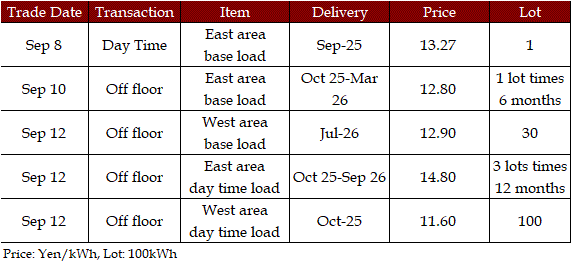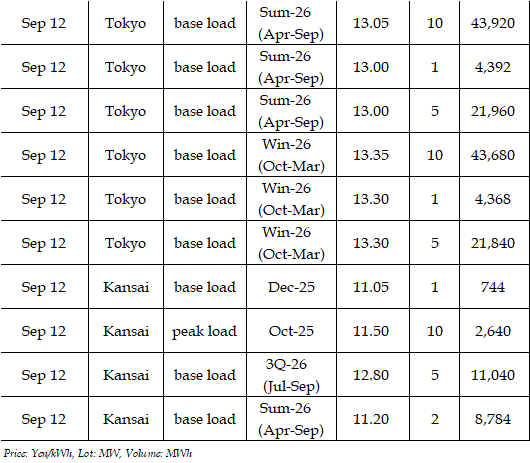Power: Sep 8-12: Spot price retreats with easing hot temperatures
|
In the day-ahead market on JEPX (Japan Electric Power Exchange), the 24-hour spot power prices on a weekly average basis for Sep 8-12 delivery retreated from the previous week in East Japan (50Hz) as well as in West Japan (60 Hz). Easing hot temperatures through large amounts of rain reduced demand and then softened prices. On Sep 12, the high temperature in Tokyo dipped below 30 degrees Celsius (28 degrees). Along with a spell of extraordinarily hot days gone away in West Japan, prices slumped further.
The 24-hour spot average between Tokyo and Kansai, a major market area in East and West Japan, was Yen 1.73 on Sep 8, Yen 0.95 on Sep 9, Yen 0.64 on Sep 10, Yen 0.56 on Sep 11, and Yen 0.94 on Sep 12. All the spreads were in favor of East.
The fuel market trends in the second week of September were detailed as follows.
DES Northeast Asia spot LNG prices almost gained from the previous week. Prices for prompt October 2025 delivery were at mid-$11's per mmBtu as of Sep 11, up 20cts from the end of the previous week (Sep 5). Strong natural gas markets in Europe raised the DES Northeast Asia spot market; however, weak buying interest from end-users in the region reduced rises in prices. The Ministry of Economy, Trade and Industry (METI) announced on Sep 10 that Japan's LNG inventories for power generation stood at 1.81 mil mt as of Sep 7, down 200,000 mt from a week before owing to scorching weather, which resulted in a high run of LNG-burned power plants. The figure was below 1.83 mil mt at the end of September last year and the average for the past five years (2.05 mil mt).
FOB Newcastle thermal coal prices in Australia were at high $ 100's for September 2025 loading as of Sep 11, down $6.5 from the previous week.
In the crude oil market, WTI crude for October 2025 stood at high- $61's per barrel at 13:00 on Sep 12, while Brent crude for November 2025 was trading at the high-$65's. Prices did not change much from the end of the previous week for WTI and Brent. While the heightened geopolitical risk in Russia and the Middle East supported prices, the opaque outlook for the US economy as well as the increased production outlook by OPEC weighed on them. As a result, the market fell to a lull.
The actual highest price during the week was at Yen 50.00 in Hokkaido on Sep 10; the actual lowest price during the week was at Yen 5.00 in Hokkaido on Sep 8 .
By area, the weekly average of the 24-hour spot prices was at Yen 16.03 in Hokkaido, up Yen 1.89 from the previous week; Yen 12.67 in Tohoku, down Yen 0.61; Yen 13.67 in Tokyo, down Yen 2.26; Yen 13.11 in Chubu, down Yen 1.82; Yen 12.71 in Hokuriku and Kansai, down Yen 1.48; Yen 11.89 in Chugoku, down Yen 0.86; Yen 9.60 in Shikoku, down Yen 2.50; and Yen 11.98 in Kyushu, down Yen 0.86.
In the JEPX auction, the volume of offers was 1,201.05 mil kWh on a weekly average basis, up 0.1% from the previous week. Meanwhile, bids on a weekly average basis were down 0.4% to 1,170.24 mil kWh. The weekly average of trade volumes recorded 860.44 mil kWh, down 2.5%.
Power demand in nine areas of Japan during Sep 8-12 was a combined 13,726.17 mil kWh, down 3.1% from 14,164.26 mil kWh during Sep 1-5. The figure was up/down 4.9% from the corresponding period a year earlier, which was 14,436.90 mil kWh during Sep 9-13, 2024, after day-of-week adjustment.
Deals reported on TOCOM (Tokyo Commodity Exchange) during Sep 8-12 were as below.
Deals reported on EEX (European Energy Exchange) during Sep 8-12 were as below.
Prices for the third week of September were expected to rise further after the three-day holiday. Temperatures were expected to hover at over 30 degrees Celsius from Tohoku through Kyushu, with a chance of over 35 degrees in Nagoya and Osaka. Supply of power, on the other hand, was forecasted to be curbed due to the increase in regular maintenance of thermal power plants, tightening a supply/demand balance in power. "Base load prices in Tokyo will exceed Yen 14.00 owing to high temperatures until the middle of the week, and then prices will soften in response to easing hot temperatures in the latter half of the week. In Kansai, prices will hover Yen 1.00 lower than in Tokyo," a source at a power producer and supplier said.
|
||||||||||||||||||||||||||||||











